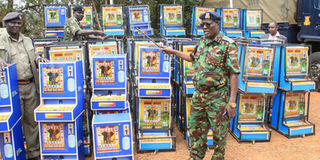Tax on gaming offensive, leaves nothing in till

Police officers in Kisii on November 8, 2016 display gambling machines that were impounded on transit to Nairobi. Gaming companies pay a corporation tax of 30 per cent. PHOTO | BENSON MOMANYI | NATION MEDIA GROUP
What you need to know:
- Jobs will be lost and not created as establishments revise their operational costs.
- The model used to arrive at the new tax figure is ill-advised and inconsiderate.
Gaming companies are staring at a crisis starting from January 1, 2018 due to the imposed 35 per cent tax on their gross revenues.
Currently, the industry pays an across-the-sector 30 per cent corporation tax as well as individual sub-sector taxes that include: Gaming 12 per cent, betting 7.5 per cent, lotteries five per cent and prize competition 15 per cent.
The Finance Act, 2017 has insensibly hiked the above taxes by 191 per cent, 367 per cent, 600 per cent and 133 per cent, respectively, to a uniform 35 per cent tax across the board without taking into consideration the compulsory 30 per cent corporation tax and the respective gaming sector diverse business operation models.
PARTICIPATION
The question is: What informed the decision to slap the sector with these taxes? Industry bottom line?
Respective sub-sector bottom line? Number of youth affected?
Was it a fair approach, taking into consideration that industry players were not engaged when arriving at this new tax?
Furthermore, the Kenya Revenue Authority (KRA) and the Betting Control & Licensing Board (BCLB), as well as Parliament’s Finance Committee, had advised the House against raising this tax.
RESPONSIBLE GAMBLING
In addition, stating that it is a measure at protecting the youth is misplaced as ensuring responsible gaming has no relation to tax matters.
This tax imposition will have counter-effects.
Jobs will be lost and not created as establishments revise their operational costs.
Casinos (entertainment), charity sweepstakes (charity projects), jockey club (entertainment and a horse racing sport) — which fall under gaming and lotteries — will suffer the most as they employ hundreds of thousands of staff.
What the decision to impose this punitive tax did not consider is that responsible gaming is a totally different subject.
CONTRIBUTIONS TO KRA
The model used to arrive at the new tax figure is ill-advised and inconsiderate.
In the spirit of transparency and accountability, the BCLB, the industry regulators, who are well-informed of all operational models in the sector, should inform the public and the government on each sub-sector’s business model.
KRA should also publish a sector-by-sector contribution to the Exchequer for all to be able to see and understand the respective gaming sector contributions.
GOVT REVENUE
Under the 2017 tax regime there is a possibility of earning corporation tax.
During submissions to the parliamentary committee, KRA Commissioner-General John Njiraini stated that, in 2016, the gaming industry contributed to the Exchequer Sh4.7 billion in corporation taxes only.
This did not include PAYE, 12 per cent on gaming, five per cent on lotteries or 7.5 per cent for betting.
In the Financial Year 2017, KRA will collect far much more because of the four categories of revenue taxes.
The 2018 taxes on revenue are preposterous, unrealistic and go against the grain of job creation and revenue collection that we need for national development.
JUDITH KIRAGU, Nairobi.
****
Ballot tender ruling should not scare IEBC
Friday is the D-day, when the court will decide the fate of the disputed ballot tender.
The ruling can go either way: the tender can be cancelled or the firm awarded the contract can be given the nod to proceed with printing of the ballot papers.
But whichever the verdict, IEBC still has time to get another printer.
Alternatively, we can do it locally and thus create jobs. IEBC should, therefore, not panic.
JUSTIN N. NKARANGA, Mombasa.




